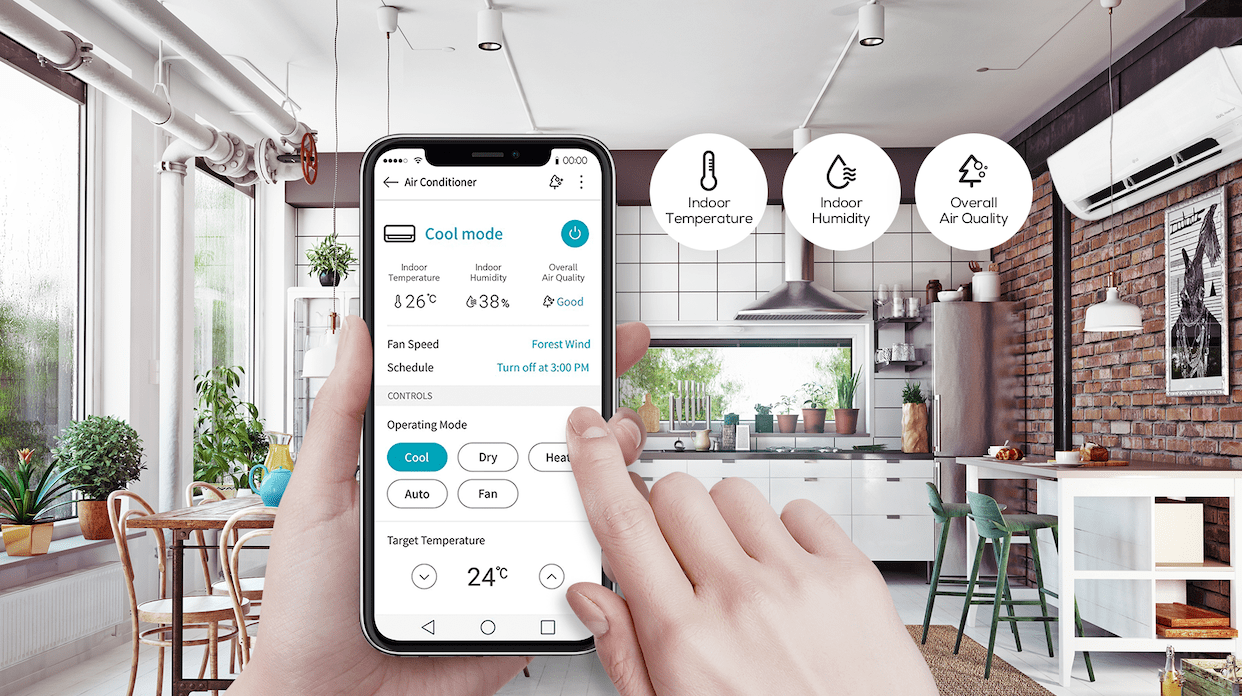Seasonal Variations And Indoor Air Quality
Summer Challenges
- Open windows introduce outdoor allergens and increase humidity.
- Air conditioners circulate existing dust, aggravating sensitivities.
Winter Challenges
- Low humidity, exacerbated by heating systems, causes dryness and respiratory discomfort.
- Closed windows trap indoor pollutants like dust mites and pet dander, leading to their accumulation.
Maintaining Optimal Air Quality
- Ventilate regularly.
- Change air filters.
- Regulate humidity with humidifiers/dehumidifiers.
- Minimize indoor pollutants through cleaning.
- Consider using air purifiers.
By handling seasonal shifts and doing these measures, homes can achieve a healthier indoor environment.
Seasonal Effects On Indoor Air Quality And Strategies For Improvement
Indoor air quality is super important for our health. It's all about the air we breathe inside our homes. But did you know that the air quality can change with the seasons? Yeah, it's true! When the weather gets hot or cold, it can affect the air inside our houses. That's why we need to know how these changes happen and what we can do about them.
- Indoor air quality is important for our health.
- Weather changes can affect the air inside our homes.
- Air purification testing checks if the air is clean.
- Air quality testing service professionals test our air for safety.
- These services help us understand and improve our indoor air.
- Let's explore how seasonal changes impact the air we breathe indoors!
Temperature And Indoor Air Quality
Temperature fluctuations can affect how clean the air is inside your home. When it gets cold, we turn on heaters to stay warm, but this can make the air feel dry and dusty. Dust and other particles can build up, making the air not so good to breathe. That's why it's important to keep your home at a comfy temperature without making the air too stuffy. In summer, when it's hot outside, we use air conditioners to cool down. But if we don't clean them, they can spread dust and germs around. So, it's smart to check and clean your heating and cooling systems regularly. This helps keep the air inside fresh and healthy for you and your family. If you want to be sure your air is clean, you can even get air quality testing service or air purification testing done. These tests check how clean the air is and if there's anything harmful floating around.
Humidity Levels And Indoor Air Quality
Humidity levels inside your home can affect how clean the air is that you breathe. When it's too humid, meaning there's a lot of moisture in the air, it can make it easier for things like mold and dust mites to grow. These things can make allergies worse and even cause health problems for some people. But, when the air is too dry, it can make your skin feel itchy and your throat feel scratchy.
That's why it's important to keep an eye on the humidity levels in your home. You can use tools like air purification testing and air quality testing in Indiana. They check how clean your air is and if the humidity is right. If they're not, you can take steps like using a humidifier to add moisture to the air or a dehumidifier to take moisture out. This can help keep your home's air clean and healthy for you and your family.
Related: How To Get Better Air Quality In-House?

Outdoor Air Pollution And Its Impact
Outdoor air pollution refers to harmful substances in the air outside. These substances come from cars, factories, and other human activities. They can also come from natural sources like wildfires and volcanic eruptions. When outdoor air pollution enters our homes, it affects indoor air quality. This can happen through open windows, doors, and ventilation systems. Air purification testing helps to identify these pollutants in the air.
It measures things like dust, pollen, and chemicals. An indoor air quality testing can also check for outdoor pollutants inside your home. These services use special tools to measure air quality and recommend ways to improve it. By understanding outdoor air pollution and its impact on indoor air quality, we can take steps to make our homes healthier places to live.
Role Of HVAC Systems
HVAC systems are like your home's air managers. They keep things comfy and safe. In the world of indoor air quality testing, they're like the detectives. They check the air quality and make sure everything's okay. When seasons change, HVAC systems play a big role. In winter, they warm your home, but they can also dry out the air. Dry air can make you feel itchy and sick. In summer, they cool things down, but too much moisture can make mold grow.
That's not good for your health either. To keep your air clean, HVAC systems need help. You've got to change their filters regularly. Filters catch dust and pollen, so they need a change to keep working well. Also, get your HVAC system checked by a professional. They'll make sure everything's running smoothly and your air quality test gets a thumbs up!
Related: How To Improve Air Quality in House?
Seasonal Allergens And Indoor Air Quality
Seasonal allergens like pollen, dust mites, and mold can make indoor air yucky. When seasons change, these allergens sneak into our homes through windows and doors. They hide in carpets, curtains, and furniture, making it hard to breathe for some people. Indoor air quality testing helps us find out if our homes have too many allergens. It's like a check-up for our house's air. During an air quality test, experts use special tools to see what's floating around.
If the test shows high levels of allergens, we can take action to clean the air. To fight seasonal allergens, we can vacuum often, wash bedding in hot water, and keep windows closed on windy days. Air purifiers can also help remove allergens from the air. By testing our indoor air quality and taking steps to reduce allergens, we can breathe easier all year long.
Indoor Activities And Indoor Air Quality
When we do stuff inside our homes, we might not realize we're affecting the air we breathe. Simple activities like cooking, cleaning, and even using stuff like air fresheners can make the air less healthy. Cooking, especially frying, can release particles and gases that lower air quality. Cleaning with certain products can also add chemicals to the air that aren't good for us to breathe in. Even things like painting walls or using glue can let out fumes that make the air worse. It's like invisible pollution inside our homes!
That's why it's important to think about what we're doing and how it might affect the air we breathe. If we're worried, we can get something called indoor air quality testing or an air quality test to check how healthy our indoor air is. These tests can tell us if there are any problems with the air in our homes and what we can do to make it better. So, next time you're doing something indoors, think about how it might be affecting the air you breathe!
Strategies For Maintaining Clean Indoor Air Throughout Changing Seasons
Keeping our indoor air clean is super important for our health. Seasons can change how clean our air is. When it's cold outside, we use heaters that can make the air dry and trap bad stuff inside. But when it's hot, we open windows and let in fresh air. But, that fresh air can also bring in pollen and pollution. Our air conditioners can help, but they need to be looked after.
- Keeping indoor air clean is crucial for our health.
- Seasons affect indoor air quality by changing how we heat and ventilate our homes.
- Cold weather can make indoor air dry and trap pollutants.
- Hot weather may bring in outdoor pollutants like pollen and pollution.
- Regular maintenance of HVAC systems is important for clean indoor air.
- Cleaning and changing filters in air conditioners can make a big difference.
- Avoid using too many chemicals indoors to maintain air quality.
- Let's work together to keep our indoor air fresh and clean for better health!
Related: How To Improve Basement Air Quality?


